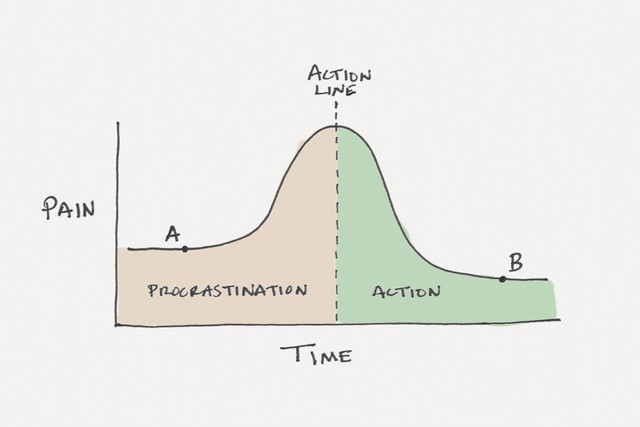Nikoo Givehchian
Cannon Contributor
I can still recall the glorious days when I thought procrastination was, for me, impossible. How naive I was back then…
I remember once, when my ninth grade teacher assigned us an essay that was to be handed in a week later, and also gave us in class time to work on it. My friends exchanged grins with one another, all sharing in the same not-so-secret joke that they had not been given a week to write the essay, but only the night before. I worked hard in class that first day to finish the essay while my friends guiltily enjoyed the ‘free time’ they had been given by opening a word document, saving it, and pushing their laptops aside so as not to disturb the circle they sat in, on the fluffy carpet we used to have in our class. Flash forward to the next day when I came to school with a finished essay, and without looking at it again, I joined my ring of friends, telling them, to their surprise, that I was done. Thus, I too was able to enjoy time with my friends after getting my work over and done with. Furthermore, I will confess I did find it amusing when the night before it was due, they came to me to proofread their papers.
The thing is, my essay was not the best either. I wanted to finish it too quickly, and thoughtlessly used the first ideas that came to mind rather than reflecting and structuring the best ones before writing the essay. But, in any case, I was done, and at the time I thought reaching this finish line, and getting there first, was all that mattered. Quality? Nah, and not quantity either just to be done was what I thought of as sufficient.
So, it is funny that while Procrastination: Possibly Beneficial? extreme procrastination led to a bad essay (as expected), the other extreme of rushing to finish my work as soon as possible also hindered my ability to write a good essay. All of us are familiar with the failure of last-second attempts to do anything. Since the beginning of high school, especially over this past year, I have also switched from being extremely opposed to procrastination, to becoming another who weakly succumbs to this tempting possibility over and over again. This is to my enormous shame. I would never go about promoting procrastination, and the misery I felt every time I saw the results of my putting work off. I am not here to tell you that extreme procrastination is good. However, I do want to draw attention to the negative connotation commonly associated with the term, and question people’s assumptions when they think about procrastination.
One thing is for sure- It is not just me (and I am not sure if this is a comfort), but procrastination appears to simply be a part of human nature. No matter what, there will always be something we leave to do later. But, the real question stands: Is that so bad?
To what extent do our procrastinatory tendencies (yes, that’s a term now) allow us to later excel?
There has been research to indicate that the most successful of us tend to procrastinate a little (check out Adam Grant’s TEDtalk on the matter!), while others with zero or extreme procrastination tend not to be as successful… So clearly, there is hope for we who procrastinate! This is in part due to the fact that moderate procrastination leaves a bit of time between receiving and doing a task, and allows an idea to ‘settle’ a little in a person’s mind before they take action. Thus, ideas have the opportunity to mature and gain potential during this developmental period. In essence, hesitating a bit and leaving some work for later actually creates room for inspiration. Procrastinating a little and planning to return to work later actually allows for reflection, which can really help with developing the best ideas.
The greatest and most innovative scientists did not come up with their ideas in a rush and on the spot. Nor did they completely and continually push off their desire to innovate an obvious fact when one considers how their accomplishments could not have occurred by accident and without any hard work, even if they did take breaks in between. Time to think was always essential to the greats, and even geniuses such as Newton took years to develop their most famous ideas- in this case, gravity and calculus. However, taking time off does not mean pushing off the activity, and it is not because they completely procrastinated until the last moment. Both rushing and continually procrastinating have the same net effect on a person: a forced neglect of deep thought and consideration. Great figures of history seem to have found a way to balance urgency of work, and a need to go back and forth with ideas for a while.
Newton is clearly an example of one who was very much accomplished, but even your average undergraduate engineering student could use knowledge of the benefits of moderate procrastination to their advantage. I know I could, and I do not doubt there are many others out there who share my pain in having procrastinated too much or too little. And yes, at this point, I believe we have made a solid case for the hindering properties of minimal procrastination; after all, how accurate would Newton have gotten with his exploration of gravity if he had not given it some thought and considered calculus? If he had rushed to a solution using the quick, convenient, and inaccurate answers of his predecessors, much knowledge and innovation would have been lost- or at the very least, Newton would have failed to be the one to discover it. Much in the same way, if we students attempt to rush through an assignment for the sake of finishing it early, the likelihood of us making simple mistakes increases by a large factor.
Funny then, that though I used to think getting work done as early as possible was best, this is not exactly the case. What happened in ninth grade reflects the two extremes — no procrastination on my part, and extreme procrastination on my friends’ part. Perhaps the best thing for all of us to have done was to let the topic of the essay sink in for a day and then to finish it in the next couple days. My wanting to finish it immediately left me no room for creative thoughts; my friends’ leaving the essay to the last minute left them no room for creative thought either. The most successful students with the best essays are not those who rush to finish or leave it to the last minute — they are the ones who first take a moment to think, then write it in good time. Thus, one may call this ‘limited’ or ‘moderate’ procrastination, but in any case, it has been the method that yields the most success in my experience.
Procrastination is inevitable — that, we know. However, we can all work to limit the extreme version of procrastination by planning out our work, while at the same time realizing that there is value to be found in procrastinating just a little bit. That being said, don’t procrastinate too much — trying to find inspiration at 3:00 AM doesn’t work out well, trust me!


